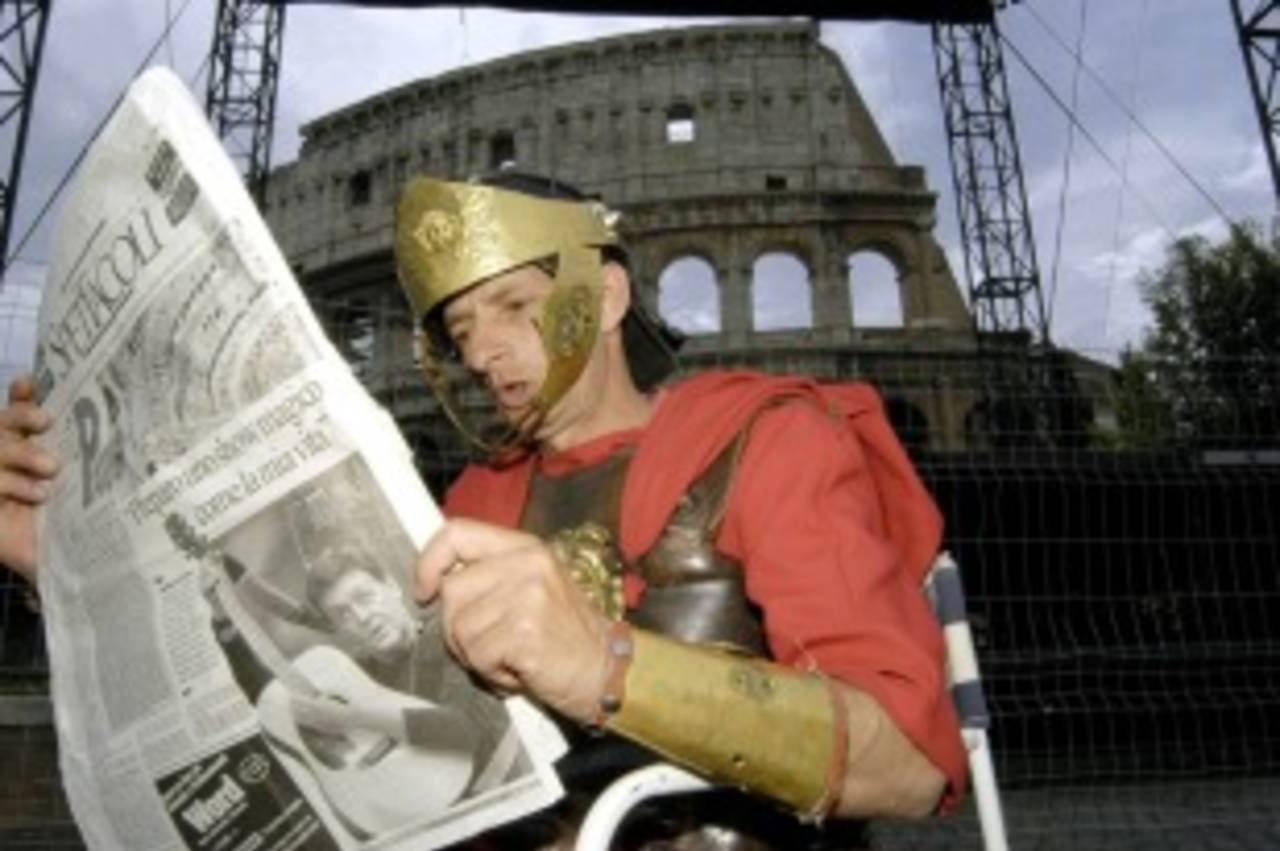The World Cup of 75 BC
If you think the current tournament is only the tenth such, you've got another think coming
Andrew Hughes
Mar 10, 2011, 5:36 AM

As if having the past-his-prime Paul McCartney for the opening ceremony was not bad enough, the fans discovered the authorities had a 2.5 cubit rule in place for referrals • Getty Images
Cricket archaeologists recently made a startling discovery amongst the ruins of the Coliseum in Rome. Buried underneath a pile of Italian Wisdens, they came across a casket containing the personal effects of the Roman historian Implausibilius. Inside, along with a slightly damaged groin protector and a copy of Richie Benaud's autobiography, they found a dusty scroll; a scroll that described the first ever cricket World Cup, held in Rome, in 75 BC. Here, exclusive to ESPNcricinfo, is the full translation:
"Our beloved Emperor attended the opening festivities of the inaugural Imperial Cup. There was much singing and rejoicing as the captains of the invited teams were led past in chains, although many sage voices were heard to remark that the smaller provinces would not offer much of a challenge, and that it was a mistake to invite the wilder elements. This was proven to be wise as in their first group game the Goths demolished the stadium, set fire to the stumps and were given lifetime bans.
There was more controversy in the quarter-final between Parthia and Scythia, when one of the legionnaires charged with holding aloft the stone scoring tablets, having consumed too much spiced wine at the interval, fainted and dropped his C. The unfortunate Parthians easily scored CCXLVII but were full of wrath when they discovered that they were C short. The Parthian captain protested but after he was thrown to the lions, his team-mates decided to accept the result.
The new Roman technology was much acclaimed. For run-out appeals, the match soothsayer settled the matter by consulting the entrails of a squirrel. And the Eagle Eye method, in which stone carvers chiselled a diagram of the ball's progress into marble, was a great success. A referral to Eagle Eye took less than an hour, and to ensure that the technology was not abused, in the event of a failed referral, the captain of the referring side was thrown to the lions. Happily there were very few referrals.
The Greeks were the favourites and they reached the semi-finals with ease. Their cause was lost, however, when they started arguing amongst themselves. It was said that the Stoics would not talk to the Epicureans and that the Spartans wanted nothing to do with the Athenians. And it was observed that their habit of holding philosophy seminars in the slip cordon cost them many unnecessary runs.
The final was between the glorious Roman team and our visitors from Carthage. The Carthaginians had enjoyed success thanks to their cunning deployment of a googly-bowling pachyderm that had greatly disconcerted all of their opponents. But the home team by this time knew of the beast and on the morning of the game a patriotic Roman unfastened its collar, whereupon the creature trumped off and was never seen again. Thus it was said that the Carthaginians had lost the elephant of surprise.*
The Roman general won the toss and retired to his tent to await an omen. After several hours' delay, he decided to bat first after seeing a black hawk with a white tail clutching a snake in its talons fly anti-clockwise around the stadium and perch on the highest branch of an olive tree. Rome lost. The Carthaginians received many laurel wreaths and a gaudy urn, which they bore off to their capital. Their victory, though, was short-lived. To the eternal glory of the Emperor, a Roman army landed at Carthage the next morning, burned the city to the ground, regained the trophy and returned in triumph.
The tournament was then declared to be over, after a closing ceremony at which the commentators were all thrown to the lions, as it was widely said that they had brought ill-luck on proceedings with their excited jabbering and cries of 'DLF Maximus!' and 'That went to the boundary like a ballista bolt!'"
* Scholars believe that this ancient pun also featured in an early draft of the Aeneid, but that Virgil, perhaps wisely, decided to leave it out of the final version.
Andrew Hughes is a writer currently based in England